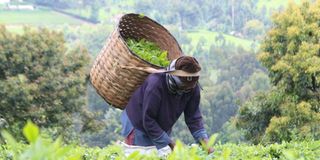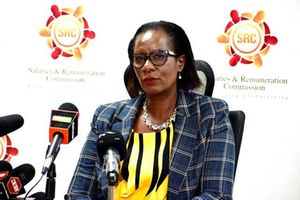Tea farmers express anger over aborted KTDA elections

A farmer picking tea.
Tea factory directors elections set for Friday flopped due to delays in the printing of ballot papers amid blame games between the Independent Electoral and Boundaries Commission (IEBC) and the Tea Board of Kenya.
The elections were to kick off at 7 am but IEBC cited challenges in the delivery of voting materials.
However, farmers who had turned out early in the morning to cast their vote in the first secret ballot election left after waiting for hours.
The memo sent on Friday, June 28, morning stated that voting would start at 11 am.
“The delay has been occasioned by the late certification of the register of voters and unforeseen public demonstrations that interrupted the printing and movement of ballot papers,” said a statement by IEBC national returning officer Martin Nyaga.
In Murang'a County farmers complained that the flopped elections might be used to rig in unpopular aspirants.
Those affected were 10 coffee factories in the county.
A farmer at Kanyenyaini tea factory, Ms Elizabeth Mwangi said the elections were expected to end leadership wrangles.
A former tea factory director in Meru, who is familiar with the election preparations, told Nation that the delay was a result of a failure in the IEBC and the Tea Board of Kenya.
"The Tea Board of Kenya received money from Kenya Tea Development Agency (KTDA) but paid IEBC very late. We understand that the printing of ballot papers started on Thursday. They are using the public protests as a scapegoat," the former director said.
An IEBC official who spoke in confidence also said printing of materials had been delayed.
The IEBC was tasked with overseeing the elections in 54 Small Holder Tea Factories in 15 counties to ensure a free, fair and credible process.
But several candidates who spoke to Nation said the IEBC's credibility was at stake.
“There is total confusion across the tea zones. We are now trying to manage farmers so that they don’t abandon the process,” said Mr Paul Ringera, a candidate.
In Kirinyaga, Embu, Tharaka Nithi and Nyeri, farmers accused the IEBC of being inefficient and threatened to boycott the polls if the electoral body officials didn't explain why the polls had been delayed.
"They should tell us what is wrong or else we go back to our respective homes without casting votes," said Ms Alice Wandia, a farmer in Kirinyaga.
A spot check by the Nation established that farmers started streaming into the polling stations as early as 5 am.
As late as 3 pm, farmers were still stranded at various polling stations.
In South Rift, similar challenges characterized KTDA elections in the region.
Small-scale tea growers in Kericho, Bomet, Nakuru and Narok counties expressed their frustrations over the delay in opening polling stations.
Mr Robert Korir, the chairman of KTDA tea buying centre in Chepchabas, Konoin constituency of Bomet county said hundreds of farmers had converged at the polling station from early morning in the hope the election material would be delivered.
“We have not received any information on the cause of the delay or whether new timelines had been set by IEBC and KTDA,” Mr Korir said.
Ms Catherine Ketoek, a tea grower said the elderly were the most affected as they had been brought to the polling stations early in the morning to vote and then returned to their homes.
"Women and the elderly had to camp for hours at the buying centres," Ms Ketoek said.
Mr Simon Chepkwony and Mr Philip Koech, speaking on behalf of the farmers in the region, said some of them had taken a few hours off from their workstations to vote, but had been forced to return without casting their ballots due to the delays.
“Unfortunately, we have to go back to work without casting our votes,” Mr Chepkwony said.
In Kisii and Nyamira counties, elections had not started by 3 pm.
Farmers thronged the 15 tea factories and tea buying centres in the larger Gusii region from as early as 7 am.
"We have been outside this factory since morning, waiting to cast our votes," said Mr Peter Nyakundi of Nyamache factory in Kisii.
"We are waiting for a way forward. There is scanty information on why the exercise is not going on," said Mary Moraa of Ogembo factory.
-Reported by Vitalis Kimtai, Ruth Mbula, David Muchui, George Munene, Mercy Mwende and Mwangi Muiruri





